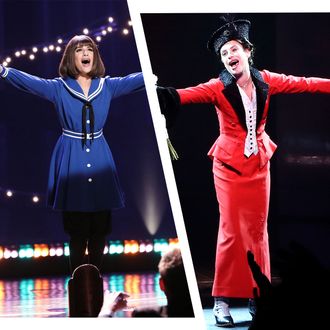
April 22, 2014: “I can’t do it, Kurt. You’re going to have to read it,” says a nervous Rachel Berry in season five of Glee. It’s a cold morning in New York, and Rachel is about to hear the most important review of her lifetime, because she’s recently opened in Funny Girl on Broadway.
September 29, 2022: “I can’t do it, Jonathan. You’re going to have to read it,” a nervous and — if you ask the internet — illiterate Lea Michele presumably said. It’s a cold morning in New York, and Lea is about to hear the most important review of her lifetime, because she’s recently opened in Funny Girl on Broadway.
Yes, it’s true. Lea Michele has not only played Fanny Brice on Broadway, fulfilling both her own dream and the long-held dream of her character Rachel Berry on Glee, but she and Rachel have both been reviewed by the New York Times. Glee makes the bold creative choice to not only show that Rachel has gotten a positive review, but to have the characters read the rave out loud. And, actually? They’re pretty similar. (Damn it, Ryan Murphy, you’ve done it again!)
For starters, both reviews treat the original Funny Girl script as an absolute piece of dog shit. “One might ask themselves why?” reads the Glee review. “Why, when there are so many new playwrights, would Sidney Greene decide to dust off this tired old girl of a play?” Jesse Green in the Times (no relation to the fictional producer Sidney Greene) is just as derisive. “Though it can be a great vehicle, Funny Girl has rarely been a great ride,” Green writes. “The book seems to have been assembled from a warehouse of used musical-comedy parts.”
They also agree that Lea Michele/Rachel Berry is the show’s saving grace, even in the face of Barbra Streisand comparisons. “It takes chutzpah to step into the ‘The Great One’s’ knee-high lace-ups and make Fanny your own,” says the Glee viewer. “But she also has something else in spades: talent!” The Times is just as effusive: “That Michele makes Funny Girl seem better than we know it to be is the wonderful but possibly irreproducible product of the mutual need between an old-fashioned talent on the way up and an old-fashioned musical on the way down.”
Where there are differences, they largely stem from the different levels of fame and … notoriety that Lea and Rachel have. “I’m sure I could find fault in this green actress’s performance,” reads the Glee-view. “But shame on anyone who would have the audacity to criticize the bold mistakes of the supernova exploding before our eyes.” Lea Michele is more known for things like racial microaggressions, an intense, borderline need to put on a show, and Glee. “She seems to have been trying out for the role since 2009,” Green quips. “The songs work (and the scenes nearly do) when a performer can access a manic desperation to succeed, not caring how she comes off or what she loses in the process. Let’s just say that Michele, like her idol, has that access.”
But perhaps the funniest difference is that for all the similarities between the reviews, there is one place where the two separate: Jesse Green doesn’t like Lea Michele’s performances of the songs on Glee, the very performances he fake-reviewed in 2014. “Over the course of her six seasons as Rachel Berry on Glee, she sang most of Fanny’s numbers with exceedingly high polish, if sometimes a powerful whiff of Streisand karaoke.” Fascinating that, in the years since Glee, Lea Michele has managed to shake off the karaoke allegations and deliver a performance worthy of the review Ryan Murphy wrote for her. One last similarity: Given that one leaves the show within a few weeks (to audition for a pilot in L.A.) and the other is a replacement for Beanie Feldstein, neither Rachel Berry nor Lea Michele will be nominated for any Tony Awards.


